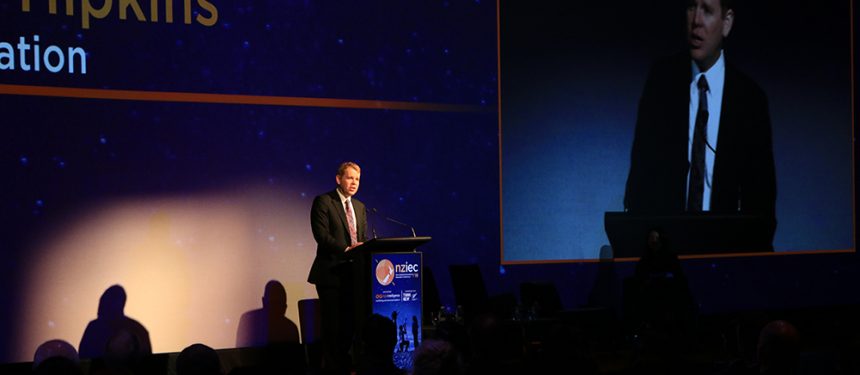Cross-institutional and cross-sector collaboration is key to the ongoing success of New Zealand’s international education industry as it prepares for substantial change, delegates were told at the recent New Zealand International Education Conference.
News and business analysis for Professionals in International Education
Have some pie!
NZ needs to recontextualise meaning of overseas education – NZIEC 2019
 Education minister Hipkins said collaboration would drive growth in New Zealand. Photo: The PIE
Education minister Hipkins said collaboration would drive growth in New Zealand. Photo: The PIE Themed ‘Navigating Our Changing World,’ the 28th annual conference brought over 600 delegates to Auckland to discuss the future directions of New Zealand’s international education industry and reflect on the year since the launch of the country’s new national strategy and post-study work rights.
“We want to grow the number of international students coming to New Zealand”
“Collaboration is an energising force and something that I see as a central factor to our success,” education minister Chris Hipkins said.
The Reform of Vocational Education, which was announced at the start of 2019 and will include the merging of New Zealand’s 16 polytechnics into one national provider, was an opportunity for the industry, Hipkins told delegates.
“We want to grow the number of international students coming to New Zealand, and we see vocational education as an area where it is ripe for a significant amount of growth,” he said.
In a year which has seen opportunities and challenges, slow visa processing times was also a key focus point throughout the conference, and Hipkins said the changes were in part a reflection of his government’s increased focus on preventing exploitation.
He added that both Immigration New Zealand and Education New Zealand would begin working with providers to vet education agents and recruit students “who want to come to New Zealand for a quality education experience”.
In his address, ENZ chair Steve Maharey said New Zealand was in a period of educational change which would have a substantial impact on the way in which the international education sector would operate.
“The world is changing, and we have to adapt to go with it,” he said.
“I am a firm believer that the only way to get change is to stop talking about the nightmares and start talking about the opportunities.”
Pointing to the 2018 international education strategy, Maharey added that to meet its economic target of $6 billion, student satisfaction goals, and focus on developing global citizens, New Zealand would need to recontextualise what overseas education meant.
“If we’re going to gather the kind of revenue we’re talking about and reach the kind of students we’re talking about, we may have to stop thinking about students simply coming here and being part of our domestic education provision,” he said.
Moving away from the economic benefits of international education, New York University senior vice president for global inclusion Lisa Coleman said institutions needed to put inclusion at the heart of their work.
“Collaboration is an energising force and something that I see as a central factor to our success”
“Global inclusion is an imperative; it’s just like technology,” she said.
“We all had to learn about technology, we have to learn how to be globally inclusive, and we have to do this from a strength-based model.”
Echoing Maharey’s comments, Coleman said framing was “very important”.
“People from marginalised groups are not the problem to be solved, because what we know is, if you frame something as a problem, what do you get? A problem,” she said.
“If you frame something as an asset, what do you get? An asset.”
In the closing address, Massey University’s deputy pro vice-chancellor Chris Gallavin summarised the need for collaboration but called for providers to shift the education paradigm.
“We have to fundamentally change our modus operandi of how we understand ourselves and see ourselves in the world,” he told delegates.
“From the old, which is that we’ve always seen ourselves as the… centre of creation and dissemination of new knowledge, to the centre of collaboration and the joint creation and joint dissemination of new knowledge.”
The 29th NZIEC conference will take place in Auckland on August 2020.
Still looking? Find by category:


